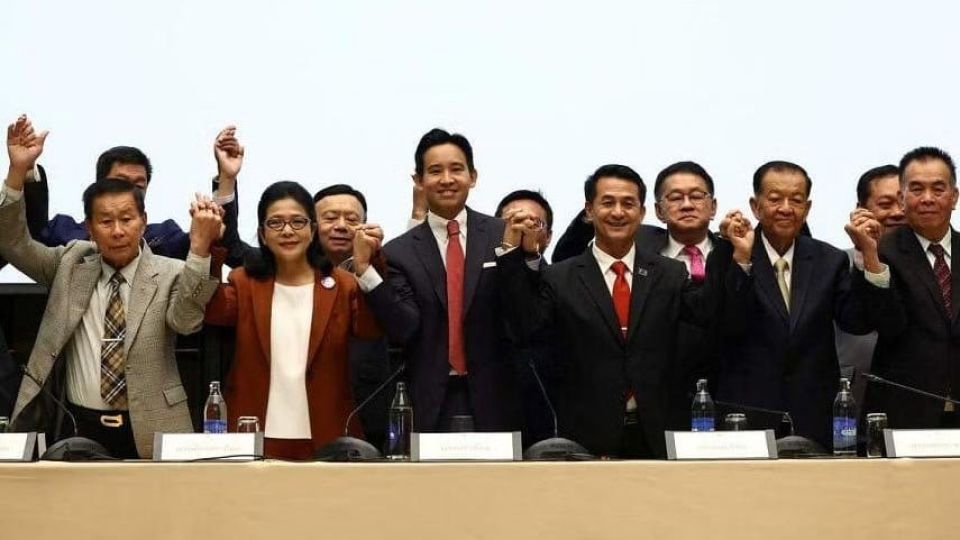May 19, 2023
BANGKOK – Thailand’s Move Forward Party (MFP) on Thursday announced it had formed a coalition made up of eight political parties with a majority in the Lower House, even as potential opposition from appointed senators threatens to derail its plan to form a government.
The MFP-led coalition has 313 of the 500 seats in the Lower House, based on preliminary poll results.
The MFP has the biggest majority with 152 seats, while the other seven parties have a combined 161 seats, and they have agreed to support MFP leader Pita Limjaroenrat’s bid for premiership.
“We are confident we can form a government,” Mr Pita told a packed press conference in Bangkok.
“My coalition is firmly taking shape. There is momentum, there is progress, and we also have a very clear road map from today until the day I become prime minister,” said the 42-year-old.
Working teams have been formed to sort out differences among the parties and to smoothen the transition of power, to minimise instability that could damage the country and its economy, he added.
“It will be the government of hope, the government of change,” he said. “We will be faithful to the people’s will, and will be the government for everyone.”
More details of the tie-up will be released next Monday.
The other parties in the MFP-led coalition are Pheu Thai, Prachachat, Thai Sang Thai, Seri Ruam Thai, Fair, Pue Thai Rumphlang and Plung Sungkom Mai.
The youthful, progressive MFP, which has pledged to reduce military influence, open up monopolised economic sectors and amend the lese majeste law, scored a surprise victory in Sunday’s general election, winning 36.23 per cent of the popular vote, according to preliminary results.
It not only routed the incumbent pro-military parties but also outperformed the Pheu Thai Party, a multiple election winner that is linked to former premier Thaksin Shinawatra.
Caretaker Prime Minister Prayut Chan-o-cha, 69, a former army chief, has helmed Thailand since staging the 2014 military coup. But his United Thai Nation party was trounced in the election, clinching only 36 seats.
While Mr Pita said he is ready to be prime minister and to serve all Thais, a military-installed political system allows an appointed 250-seat Senate to choose the premier alongside the 500-seat Lower House.
A prime ministerial candidate requires the support of at least 376 seats of the Senate and Lower House combined to lead the country. This means that even though Mr Pita’s coalition commands a Lower House majority, his path to the premiership could be blocked.
Several senators contacted by local media have expressed reservations about supporting Mr Pita for premier, citing the MFP’s bid to amend the lese majeste law.
Under the law, anyone found guilty of insulting or defaming the king, queen, heir apparent or regent can be sentenced to a jail term of up to 15 years. Proponents of the law argue it is needed to protect the monarchy. Critics, however, say the law tends to be abused for political purposes and unduly punishes the accused with pre-trial detention.
The Bhumjaithai Party, which won 70 seats based on preliminary results, said on Wednesday that it would not support a prime minister who aims to amend or abolish the lese majeste law. It added that it was ready to be in the opposition if the eventual government had such an agenda. The party was a member of the incumbent government led by Mr Prayut.
On Thursday, Mr Pita sidestepped a question about the coalition partners’ discussion on the law, saying each party had already made its stand clear during the election.
Poll runner-up Pheu Thai, with 141 seats, has tried to quell persistent rumours that it was reaching out to potential partners to form its own governing coalition. It said it would support Mr Pita’s bid for premiership and not compete with the MFP to form a government.
The process to choose a prime minister will begin only after election results are endorsed within 60 days of Sunday’s election.
Analysts are already warning that a political deadlock could trigger street protests, plunging Thailand yet again into the destructive cycle of unrest and military coups seen before 2014.
“If the senators decide to move against the will of the people, that would certainly invite more unrest and protests. That could again lead to street protests, which could be another excuse for the military to step in,” Thammasat University professor of international business Pavida Pananond told ST. “So it goes into the same loop.”


